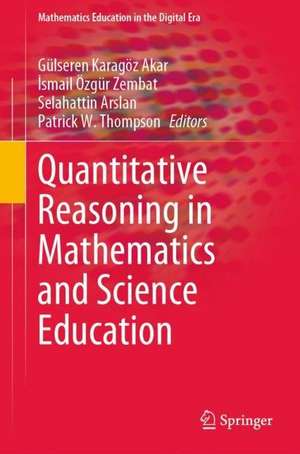Quantitative Reasoning in Mathematics and Science Education: Mathematics Education in the Digital Era, cartea 21
Editat de Gülseren Karagöz Akar, İsmail Özgür Zembat, Selahattin Arslan, Patrick W. Thompsonen Limba Engleză Hardback – 2 ian 2023
| Toate formatele și edițiile | Preț | Express |
|---|---|---|
| Paperback (1) | 892.74 lei 6-8 săpt. | |
| Springer International Publishing – 3 ian 2024 | 892.74 lei 6-8 săpt. | |
| Hardback (1) | 752.34 lei 39-44 zile | |
| Springer International Publishing – 2 ian 2023 | 752.34 lei 39-44 zile |
Din seria Mathematics Education in the Digital Era
- 15%
 Preț: 642.68 lei
Preț: 642.68 lei - 24%
 Preț: 739.43 lei
Preț: 739.43 lei - 18%
 Preț: 782.42 lei
Preț: 782.42 lei - 15%
 Preț: 644.82 lei
Preț: 644.82 lei - 18%
 Preț: 1127.15 lei
Preț: 1127.15 lei - 18%
 Preț: 959.36 lei
Preț: 959.36 lei - 18%
 Preț: 952.26 lei
Preț: 952.26 lei - 24%
 Preț: 804.90 lei
Preț: 804.90 lei - 18%
 Preț: 990.93 lei
Preț: 990.93 lei -
 Preț: 438.10 lei
Preț: 438.10 lei - 18%
 Preț: 953.03 lei
Preț: 953.03 lei - 18%
 Preț: 889.92 lei
Preț: 889.92 lei - 24%
 Preț: 825.42 lei
Preț: 825.42 lei -
 Preț: 360.15 lei
Preț: 360.15 lei - 15%
 Preț: 649.06 lei
Preț: 649.06 lei - 20%
 Preț: 573.76 lei
Preț: 573.76 lei -
 Preț: 394.29 lei
Preț: 394.29 lei -
 Preț: 389.88 lei
Preț: 389.88 lei - 15%
 Preț: 649.54 lei
Preț: 649.54 lei - 18%
 Preț: 1117.50 lei
Preț: 1117.50 lei - 18%
 Preț: 1112.78 lei
Preț: 1112.78 lei
Preț: 752.34 lei
Preț vechi: 989.92 lei
-24% Nou
Puncte Express: 1129
Preț estimativ în valută:
143.96€ • 150.01$ • 119.20£
143.96€ • 150.01$ • 119.20£
Carte tipărită la comandă
Livrare economică 31 martie-05 aprilie
Preluare comenzi: 021 569.72.76
Specificații
ISBN-13: 9783031145520
ISBN-10: 3031145526
Pagini: 340
Ilustrații: X, 340 p. 121 illus., 86 illus. in color.
Dimensiuni: 155 x 235 mm
Greutate: 0.73 kg
Ediția:1st ed. 2022
Editura: Springer International Publishing
Colecția Springer
Seria Mathematics Education in the Digital Era
Locul publicării:Cham, Switzerland
ISBN-10: 3031145526
Pagini: 340
Ilustrații: X, 340 p. 121 illus., 86 illus. in color.
Dimensiuni: 155 x 235 mm
Greutate: 0.73 kg
Ediția:1st ed. 2022
Editura: Springer International Publishing
Colecția Springer
Seria Mathematics Education in the Digital Era
Locul publicării:Cham, Switzerland
Cuprins
Introductory chapter.- 1. Forming abstracted quantitative structures.- 2. Different forms of covariation.- 3. Multiplication and Division in curriculum through QR.- 4. Relation between multiplicative/additive reasoning and QR in the context of whole and rational numbers.- 5. Linear & Non-linear relations through covariation. 6. Linear, quadratic, exponential functions through QR. - 7. Interpreting graphs of quadratic functions via QR.- 8. Logarithms and/or exponential growth.- 9. Geometric transformations through QR.- 10. Mathematization of science through QR.- 11. Physics Quantitative Literacy through QR.- 12. Modelling climate change with QR.- 13. Quantitative Reasoning in Undergraduate Biology.
Recenzii
Notă biografică
Graduating (1993-1996) from the Department of Mathematics Education in Middle East Technical University, Turkey, Gülseren Karagöz Akar earned her master’s degree in 2001 and PhD in December 2006 in Mathematics Education at the Pennsylvania State University where she continued her post-doctoral studies and worked as a full-time instructor between January 2007 and July 2008. In 2010, she started working at Boğaziçi University, Turkey, as a full time professor where she worked as the head of the Department of Mathematics and Science Education from 2018 to 2021. She was involved in the development of Turkish National Mathematics Program for Gifted (K-12) in 2018 and served as an International Advisory Board member for Journal for Research in Mathematics Education (JRME) between July 2018 and July 2021. Her research involves development of mathematical concepts and the nature of mathematics teacher knowledge.
Textul de pe ultima copertă
This book focuses on quantitative reasoning as an orienting framework to analyse learning, teaching and curriculum in mathematics and science education. Quantitative reasoning plays a vital role in learning concepts foundational to arithmetic, algebra, calculus, geometry, trigonometry and other ideas in STEM. The book draws upon the importance of quantitative reasoning and its crucial role in education. It particularly delves into quantitative reasoning related to the learning and teaching diverse mathematics and science concepts, conceptual analysis of mathematical and scientific ideas and analysis of school mathematics (K-16) curricula in different contexts. We believe that it can be considered as a reference book to be used by researchers, teacher educators, curriculum developers and pre- and in-service teachers.
Caracteristici
Provides essential information on the role of quantitative reasoning in mathematics and science education Presents research-based arguments about the learning and teaching of different mathematical concepts Includes research-informed conceptual analyses of mathematics and science concepts that cut across the K-12 curriculum
